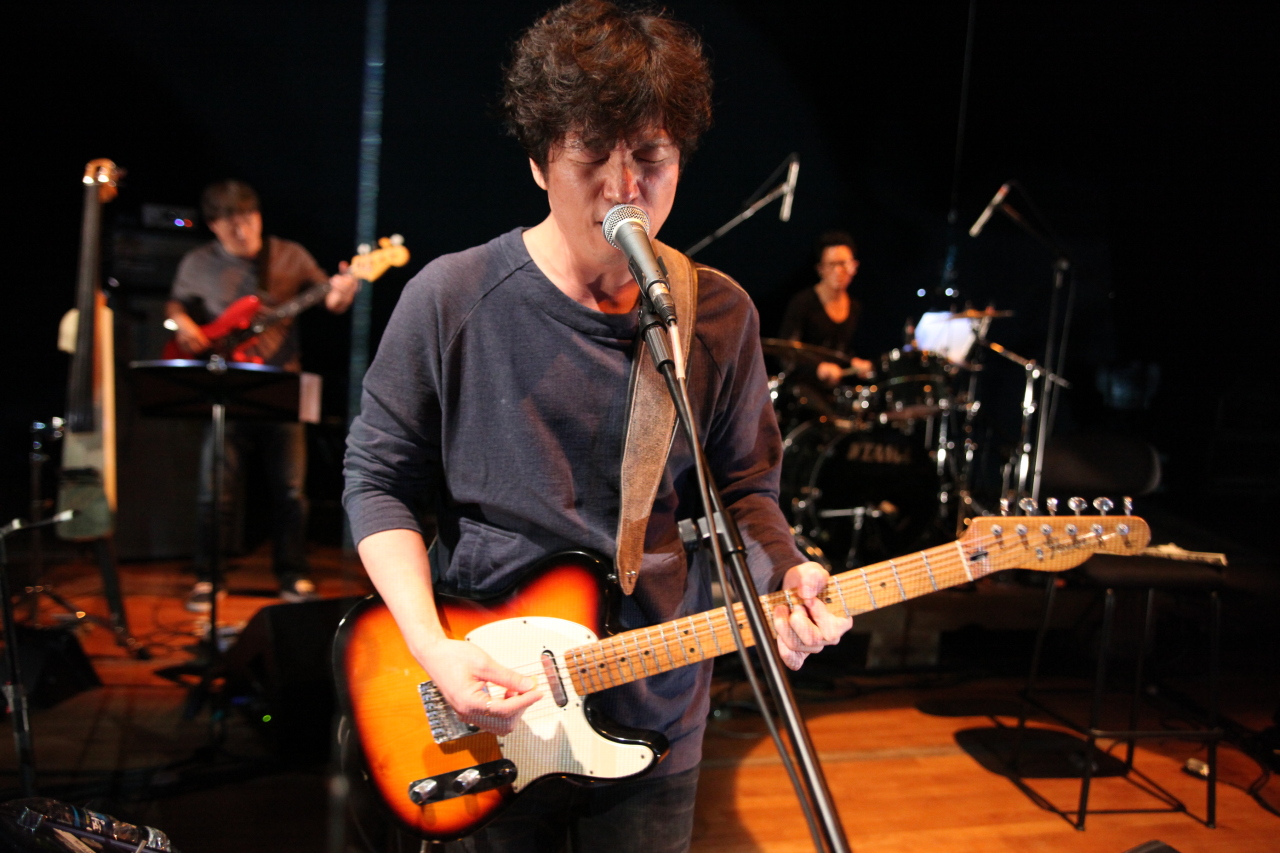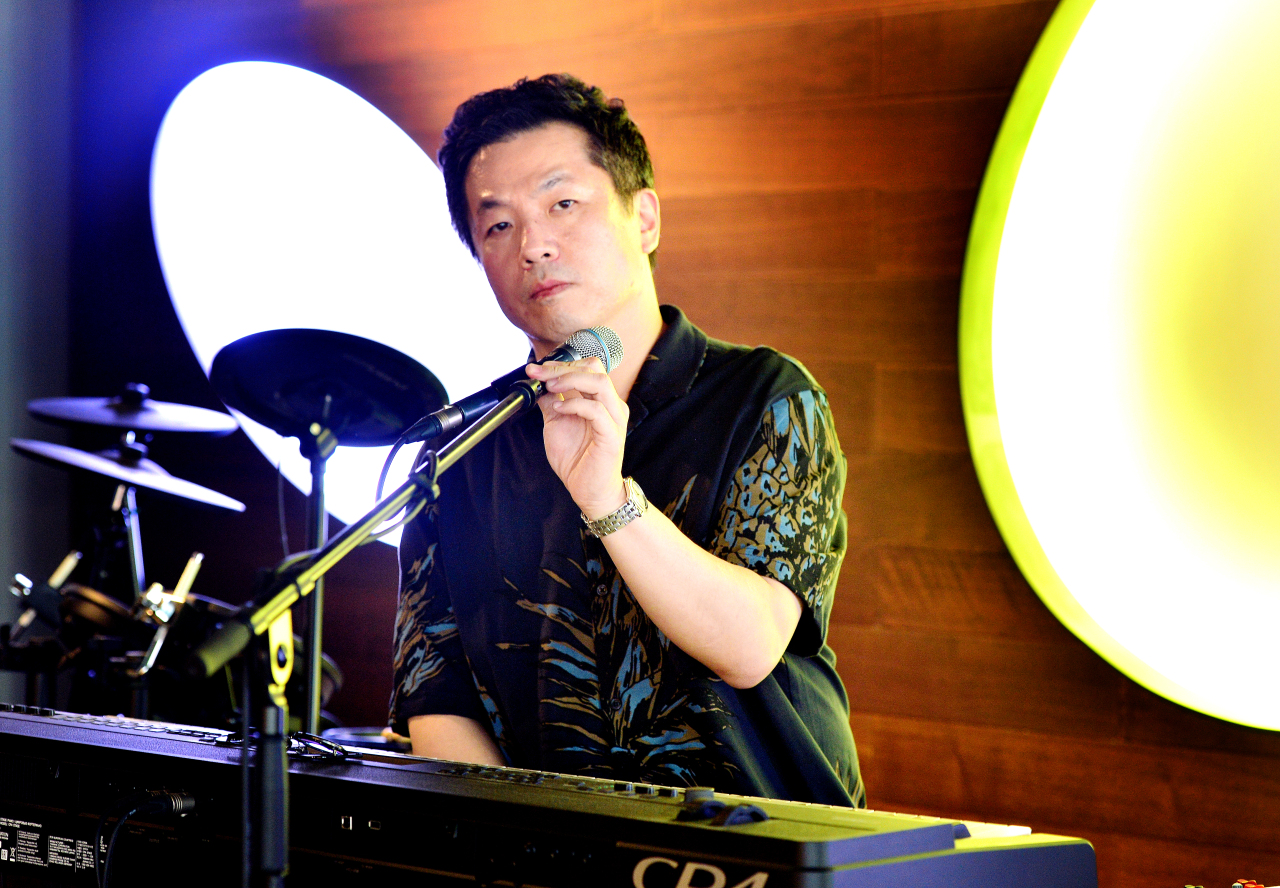Yi has been hosting one radio show after another ever since he made a debut as a radio DJ in 2007. His shows have included an indie music program, which he hosted from 2014-2017, as well as a literary show in which he read out passages and played music to go with the literary selections. He also hosted a music program on KBTS TV Chuncheon for two or three years. He has been hosting “World Music Journey” since January 2018.
As a DJ, Yi gets to introduce and listen to other people’s music. “I get to meet a wide spectrum of musicians. It is an experience that cannot be had otherwise. It is something big that I gained,” Yi said.
As for his own music, Yi said, “After 2017, I got tired of thinking about the next album.” His sixth album, “Yosaedeurimyosae,” was released in 2017.
“I’ve been on a strike since 2017,” Yi said matter of factly. “I could be bored, nervous, but I am still listening to more than 20 music pieces a day, not all of which are 100 percent to my liking,” he added.
Asked what had prompted the strike, Yi quotes Irish poet William Butler Yeats. “What Yeats called a ‘lonely impulse of delight’ and in a similar light how Charles Bukowski said not to try,” Yi said. “I needed to stop, regroup and accept, or accept, regroup and stop.”
After saying that there is no motivation yet to resume music making, Yi said, “Incidentally, I was moved by a certain line from a book. I thought about bringing music to it,” he said, adding, “I am warming up for the job.”
Just because he is on strike does not mean that he is not thinking about music, it appears. “I am creating space to be able to focus. I am testing my focus now,” he said.
What would it take it to break his strike? “A nudge, an earthquake, or a change of heart,” he said.
Yi started out as a member of U&Me Blue, a modern rock band, formed with Bang Jun-seok, while he was a student at State University of New York Binghamton. “Bang said let’s go to Korea,” Yi recalled. “It had been just a hobby in the US,” he said about the band.
Yi landed in Seoul in 1993 and the two started out performing in Hongdae clubs. “That was one of the happiest moments in my adult life,” he said, a smile on his face.
The band’s two albums were critically acclaimed and would go on to win major Korean music awards, but the band disbanded after the second album and Yi returned to the US, as he had promised his mother. “I had promised my mother that I would find a job after three years,” he said.
There was not much a musician who had returned from Korea could do in the US at the time, as the economy was gripped by a global downturn, Yi recalled. At one point, he worked nightshifts at a convenience store and it was by “pure happenstance,” to use his own words, that he got in touch with a producer from Korea. He returned to Seoul and released his first solo album in 2003.
There is no discernable continuum in Yi’s six albums so far, each album a departure from the previous one, often a radical departure. Indeed, he does not strive for a forced continuum, Yi explained, preferring, instead, a natural flow.
“Music is essentially primordial. Whether it be joy or ‘han,’ I have to want to vocalize it,” he said. “Then they just come out, although I don’t know what the catalyst is,” he said. In Yi’s view, a musician is a medium. “You ‘receive’ your ideas,” he said
Yi likened music writing to piecing together a puzzle. “Hanging on to the thread, it somehow gets finished,” he said.
His lyrics, which he describes as a hodgepodge of languages, are anything but. The soul-stirring lyrics are part of what sets Yi’s music apart.
Yi described himself as near dyslexic and claimed he is not a well-read person, but that should be taken as a statement of modesty, coming as it does from someone who cites De Quincey, Bukowski, Yeats, Tokarczuk and McCarthy, as among “many writers who intrigue me.” Indeed, literary influences abound in music “Black Leaf” in his sixth album references a poem by late poet Ki Hyeong-do, for instance.
Talking about the music scene in Korea today, Yi turns cynical. “The music industry as an industry is something I abhor,” he said, emphasizing the English word abhor for effect. “There is no place for me.” Perhaps Yi disenchantment with the industry is partly responsible for the current strike.
Yi’s music is appreciated by fans and critics alike for their bold experiments, attempts at something different. Yet, Yi is dismissive about such aspects of his music. “It doesn’t really mean anything,” Yi observed, adding, “Now, trend engulfs everything.”
“I don’t take music seriously enough these days,” he said. After all, what is the point in taking it too seriously when music has to remain in the background, he asked with a twinge of sarcasm.
Yet, Yi clearly appears to want to be moved by music. “I have respect for certain works. I am in awe every time I spend time with such content.”
Yi is an enigmatic person as is his music. He does not use social media and when he was handed over his Twitter handle by his label, he unfollowed most of the accounts, much to the dismay of the label. “You don’t unfollow unless they are psychopaths or mass murders, the agency told me,” Yi said with a chuckle.
Yi was resolute in his disavowal of social media. “I am not going to chase after something I am denied,” he said.
What does a musician on strike do during the time of the new coronavirus?
Yi is on a journey of another kind, watching Hindi thrillers on Netflix.
As for what he would like to do when the pandemic is all over, the man dubbed the “god father of Korea’s modern rock” harbors a rather refreshing wish. “The first thing I would do is go to the sauna at midnight!”
By Kim Hoo-ran (
khooran@heraldcorp.com)









![[Today’s K-pop] Blackpink’s Jennie, Lisa invited to Coachella as solo acts](http://res.heraldm.com/phpwas/restmb_idxmake.php?idx=644&simg=/content/image/2024/11/21/20241121050099_0.jpg)